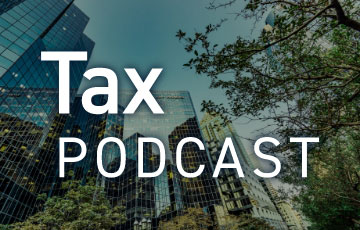Contributor:
Michael Wallach | Senior Manager, Tax Services
Established by the Tax Cuts and Jobs Act, the Opportunity Zone program has been a focal point for investors seeking tax incentives while simultaneously revitalizing economically distressed communities. One crucial aspect of managing investments in Qualified Opportunity Funds (QOFs) is understanding the tax impact stemming from the disposition of Qualified Opportunity Zone Business Property (QOZBP).
What Is QOZBP?
In short, QOZBP is an asset held by a QOF directly or by a Qualified Opportunity Zone Business (QOZB) and is defined by the statute as tangible property used in a trade or business of a QOF or a QOZB if:
- Such property was acquired by purchase from an unrelated party after December 31, 2017
- Either the “original use” of such property in the Qualified Opportunity Zone (QOZ) commences with the QOF or QOZB or the QOF or QOZB “substantially improves the property”
- During substantially all of the holding period for such property, substantially all of the use of such property was in a QOZ
In the early years of the OZ program, a majority of the investments were made in real estate. As market conditions change over time, questions arise as to whether it’s best to continue to hold the asset or sell and capitalize on favorable market conditions. In deciding whether a disposition is the right decision, please consider the following.
Tax Implication
QOZBP dispositions may trigger tax events for the QOF member in two ways – (1) the proceeds from the sale representing a return of the original gains would be treated as an inclusion event, and (2) any new gain would be allocated to the members whether sale proceeds are distributed or not.
An inclusion event is any event that reduces or terminates an investor’s qualifying investment or a distribution that constitutes a “cashing out” of the originally deferred gain. The gain recognized by an inclusion event is complicated, and investors should work with their tax advisor.
As indicated above, the allocation of new gain will be a taxable event to a QOF member. This gain event provides the investor with an opportunity to defer that gain by re-investing in the original QOF or investing in a new QOF within the prescribed investment timeline. Whether re-invested in the original QOF or a new QOF, the deferral related to this gain will begin a new 10-year holding period.
The taxability of any gain or proceeds received is governed by intricate laws and IRS guidelines surrounding the Opportunity Zone program. The treatment of the proceeds from this disposition makes all the difference in taxes potentially owed and the return on investment generated.
Reinvestment Strategy
Whether the QOF is held in the QOZBP directly or via a QOZB, the most tax-efficient structure would be a reinvestment (directly or indirectly) of a portion of the sale proceeds equal to the QOF members’ original gain in replacement QOZBP. Because the reinvestment is made by the QOF, as opposed to a distribution of the proceeds, the members would not have an inclusion event with respect to their original gain, and this would allow the members to continue to be eligible for any step-up in basis as well as the original holding period with respect to the 10-year election. The QOF must invest these proceeds into another QOZB within 12 months, depending on the type of gain from disposition.
Even if the QOF further distributes the proceeds to the QOF members, the members have the option to roll over their gains from disposition into the same QOF or a different QOF within 180 days. These options allow investors to continue deferring capital gains taxes, potentially benefit from further appreciation from their investment, and further enhance their return on investment.
Timing Matters
To enjoy the tax benefits, QOF members must meet certain holding period thresholds for their investments in a QOF. The law requires a five-year holding period in a QOF to qualify for a 10% basis increase in gains invested and a seven-year holding period to qualify for a 15% basis increase in gains invested. If a QOF member has a holding period of at least 10 years, they can make an election to treat certain gains from the disposition of QOZBP as 100% tax-free. The disposition of the QOZBP and the use of the proceeds may impact the ability of the investor to benefit from the basis increase and/or the 10-year election.
Impact on Community Development
QOZBP investments by QOFs are not just about financial returns but also a tool to address social and environmental issues, including job creation, affordable housing, environmental sustainability, and the encouragement of public-private partnerships. Investors should assess the potential impact on the local community and consider whether their investment has achieved its intended social and economic objectives.
Monitoring Regulatory Changes
The Opportunity Zone program is subject to regulatory updates and changes. These changes can affect the tax benefits, investment opportunities and compliance requirements associated with QOF investments. Staying informed about legislative developments and IRS guidelines is crucial for investors to maximize tax benefits and optimize investment returns.
Your Guide Forward
By strategically managing QOZBP dispositions and their impact on QOF members, investors can not only take advantage of tax benefits but also play a pivotal role in contributing to sustainable economic development and community revitalization. Navigating dispositions of QOZBP, the impact on QOF members, and the related tax treatment of gains requires a comprehensive understanding of tax implications, market dynamics and community impact. Cherry Bekaert’s established Opportunity Zone team is here to guide you.
As the Opportunity Zone program continues to evolve, staying informed and proactively planning is essential for maximizing returns, reducing your tax burden, and making a positive impact on both investors and communities alike. Our team can provide the tools and resources you need, including links to important legislation, research, and reports to help you make the right decisions.





